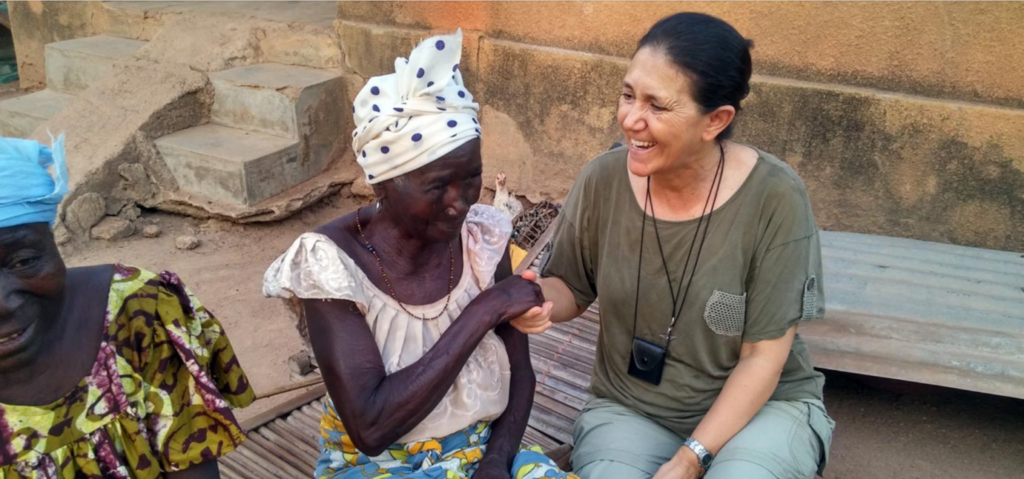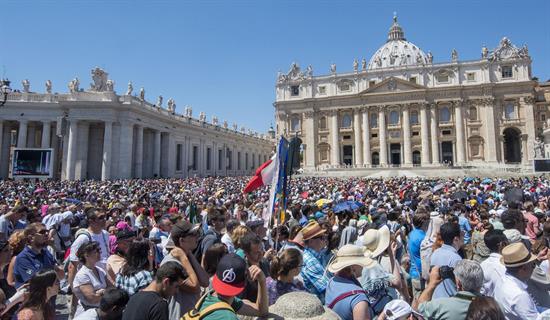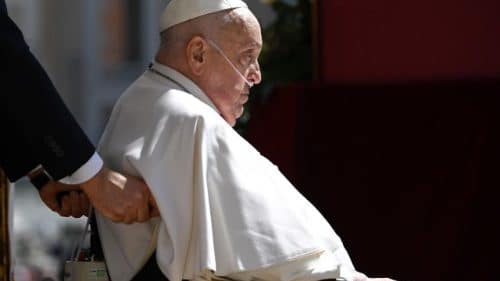“Missionaries of hope among the peoples”
99th World Mission Day

Below we publish the Message of the Holy Father Francis for the 99th World Mission Day, which is celebrated this year on Sunday, 19 October 2025, on the theme “Missionaries of hope among the peoples”:
***
Message of the Holy Father
Missionaries of Hope Among all Peoples
Dear brothers and sisters!
For World Mission Day in the Jubilee Year 2025, the central message of which is hope (cf. Bull Spes Non Confundit, 1), I have chosen the motto: “Missionaries of Hope Among all Peoples”. It reminds individual Christians and the entire Church, the community of the baptized, of our fundamental vocation to be, in the footsteps of Christ, messengers and builders of hope. I trust that it will be for everyone a time of grace with the faithful God who has given us new birth in the risen Christ “to a living hope” (cf. 1 Pet 1:3-4). Here, I would like to mention some relevant aspects of our Christian missionary identity, so that we can let ourselves be guided by the Spirit of God and burn with holy zeal for a new evangelizing season in the Church, which is sent to revive hope in a world over which dark shadows loom (cf. Fratelli Tutti, 9-55).
1. In the footsteps of Christ our hope
Celebrating the first Ordinary Jubilee of the Third Millennium after that of the Holy Year of 2000, we keep our gaze fixed on Christ, the centre of history, “the same yesterday and today and forever” (Heb 13:8). In the synagogue of Nazareth, Jesus declared that Scripture was fulfilled in the “today” of his presence in history. He thus revealed that he is the One sent by the Father with the anointing of the Holy Spirit to proclaim the Good News of the Kingdom of God and to inaugurate “the year of the Lord’s favour” for all humanity (cf. Lk 4:16-21).
In this mystic “today”, which will last until the end of the world, Christ is the fullness of salvation for all, and in a particular way for those whose only hope is God. In his earthly life, “he went about doing good and healing all” from evil and the Evil One (cf. Acts 10:38), restoring hope in God to the needy and the people. He experienced all our human frailties, save that of sin, even those critical moments that might lead to despair, as in the agony in the garden of Gethsemane and on the cross. Jesus commended everything to God the Father, obediently trusting in his saving plan for humanity, a plan of peace for a future full of hope (cf. Jer 29:11). In this way, he became the divine Missionary of hope, the supreme model of all those down the centuries who carry out their own God-given mission, even amid extreme trials.
Through his disciples, sent to all peoples and mystically accompanied by him, the Lord Jesus continues his ministry of hope for humanity. He still bends over all those who are poor, afflicted, despairing and oppressed, and pours “upon their wounds the balm of consolation and the wine of hope” (Preface “Jesus the Good Samaritan”). Obedient to her Lord and Master, and in the same spirit of service, the Church, the community of Christ’s missionary disciples, prolongs that mission, offering her life for all in the midst of the nations. While facing persecutions, tribulations and difficulties, as well as her own imperfections and failures due to the weakness of her members, the Church is constantly impelled by the love of Christ to persevere, in union with him, on her missionary journey and to hear, like him and with him, the plea of suffering humanity and, indeed, the groaning of every creature that awaits definitive redemption. This is the Church that the Lord always and for ever calls to follow in his footsteps: “not a static Church, but a missionary Church that walks with her Lord through the streets of the world” (Homily at the Concluding Mass of the Ordinary General Assembly of the Synod of Bishops, 27 October 2024).
May we too feel inspired to set out in the footsteps of the Lord Jesus to become, with him and in him, signs and messengers of hope for all, in every place and circumstance that God has granted us to live. May all the baptized, as missionary disciples of Christ, make his hope shine forth in every corner of the earth!
2. Christians, bearers and builders of hope among all peoples
In following Christ the Lord, Christians are called to hand on the Good News by sharing the concrete life situations of those whom they meet, and thus to be bearers and builders of hope. Indeed, “the joys and hopes, the grief and anguish of the people of our time, especially of those who are poor or afflicted, are the joys and hopes, the grief and anguish of the followers of Christ as well. Nothing that is genuinely human fails to find an echo in their hearts” (Gaudium et Spes 1).
This celebrated statement of the Second Vatican Council, which expresses the sentiment and style of Christian communities in every age, continues to inspire their members and helps them to walk with their brothers and sisters in the world. Here I think especially of those of you who are missionaries ad gentes. Following the Lord’s call, you have gone forth to other nations to make known the love of God in Christ. For this, I thank you most heartily! Your lives are a clear response to the command of the risen Christ, who sent his disciples to evangelize all peoples (cf. Mt 28:18-20). In this way, you are signs of the universal vocation of the baptized to become, by the power of the Spirit and daily effort, missionaries among all peoples and witnesses to the great hope given us by the Lord Jesus.
The horizon of this hope transcends the passing things of this world and opens up to those divine realities in which we share even now. Indeed, as Saint Paul VI observed, salvation in Christ, which the Church offers to all as a gift of God’s mercy, is not only “immanent, meeting material or even spiritual needs… completely caught up in temporal desires, hopes, affairs, and struggles. Rather, it exceeds all such limits in order to reach fulfilment in a communion with the one Absolute, which is God. It is a salvation both transcendent and eschatological, which indeed has its beginning in this life, but is fulfilled in eternity” (Evangelii Nuntiandi, 27).
Impelled by this great hope, Christian communities can be harbingers of a new humanity in a world that, in the most “developed” areas, shows serious symptoms of human crisis: a widespread sense of bewilderment, loneliness and indifference to the needs of the elderly, and a reluctance to make an effort to assist our neighbours in need. In the most technologically advanced nations, “proximity” is disappearing: we are all interconnected, but not related. Obsession with efficiency and an attachment to material things and ambitions are making us self-centred and incapable of altruism. The Gospel, experienced in the life of a community, can restore us to a whole, healthy, redeemed humanity.
For this reason, I once more invite all of us to carry out the works mentioned in the Bull of Indiction of the Jubilee (Nos. 7-15), with particular attention to the poorest and weakest, the sick, the elderly and those excluded from materialistic and consumerist society. And to do so with God’s “style”: with closeness, compassion and tenderness, cultivating a personal relationship with our brothers and sisters in their specific situation (cf. Evangelii Gaudium, 127-128). Often they are the ones who teach us how to live in hope. Through personal contact, we will also convey the love of the compassionate heart of the Lord. We will come to realize that “the heart of Christ… is the very core of the initial preaching of the Gospel” (Dilexit Nos, 32). By drawing from this source, we can offer with simplicity the hope we have received from God (cf. 1 Pet 1:21) and bring to others the same consolation with which we have been consoled by God (cf. 2 Cor 1:3-4). In the human and divine heart of Jesus, God wants to speak to the heart of every man and woman, drawing all of us to his love. “We have been sent to continue this mission: to be signs of the heart of Christ and the love of the Father, embracing the whole world” (Address to Participants in the General Assembly of the Pontifical Mission Societies, 3 June 2023).
3. Renewing the mission of hope
Faced with the urgency of the mission of hope today, Christ’s disciples are called first to discover how to become “artisans” of hope and restorers of an often distracted and unhappy humanity.
To this end, we need to be renewed in the Easter spirituality experienced at every Eucharistic celebration and especially during the Easter Triduum, the centre and culmination of the liturgical year. We have been baptized into the redemptive death and resurrection of Christ, into the Passover of the Lord that marks the eternal springtime of history. Consequently, we are a “springtime people”, brimming with hope to be shared with all, since in Christ “we believe and know that death and hate are not the final word” pronounced on human existence (cf. Catechesis, 23 August 2017). From the paschal mysteries, made present in liturgical celebrations and in the sacraments, we constantly draw upon the power of the Holy Spirit in order to work with zeal, determination and patience in the vast field of global evangelization. “Christ, risen and glorified, is the wellspring of our hope, and he will not deprive us of the help we need to carry out the mission which he has entrusted to us” (Evangelii Gaudium, 275). In him, we live and bear witness to that sacred hope which is “a gift from God and a task for Christians” (Hope is a Light in the Night, Vatican City 2024, 7).
Missionaries of hope are men and women of prayer, for “the person who hopes is a person who prays”, in the words of Venerable Cardinal François-Xavier Van Thuan, who was himself sustained in hope throughout his lengthy imprisonment thanks to the strength he received from faithful prayer and the Eucharist (cf. The Road of Hope, Boston, 2001, 963). Let us not forget that prayer is the primary missionary activity and at the same time “the first strength of hope” (Catechesis, 20 May 2020).
So let us renew the mission of hope, starting from prayer, especially prayer based on the word of God and particularly the Psalms, that great symphony of prayer whose composer is the Holy Spirit (cf. Catechesis, 19 June 2024). The Psalms train us to hope amid adversity, to discern the signs of hope around us, and to have the constant “missionary” desire that God be praised by all peoples (cf. Ps 41:12; 67:4). By praying, we keep alive the spark of hope lit by God within us, so that it can become a great fire, which enlightens and warms everyone around us, also by those concrete actions and gestures that prayer itself inspires.
To conclude, evangelization is always a communitarian process, like Christian hope itself (cf. Benedict XVI, Spe Salvi, 14). That process does not end with the initial preaching of the Gospel and with Baptism, but continues with the building up of Christian communities through the accompaniment of each of the baptized along the path of the Gospel. In modern society, membership in the Church is never something achieved once for all. That is why the missionary activity of handing down and shaping a mature faith in Christ is “paradigmatic for all the Church’s activity” (Evangelii Gaudium, 15), a work that requires communion of prayer and action. Here I would emphasize once more the importance of this missionary synodality of the Church, as well as the service rendered by the Pontifical Mission Societies in promoting the missionary responsibility of the baptized and supporting new Particular Churches. I urge all of you, children, young people, adults and the elderly, to participate actively in the common evangelizing mission of the Church by your witness of life and prayer, by your sacrifices and by your generosity. Thank you for this!
Dear sisters and brothers, let us turn to Mary, Mother of Jesus Christ our hope. To her we entrust our prayer for this Jubilee and for the years yet to come: “May the light of Christian hope illumine every man and woman, as a message of God’s love addressed to all! And may the Church bear faithful witness to this message in every part of the world!” (Bull Spes Non Confundit, 6).
Rome, Saint John Lateran, 25 January 2025, Feast of the Conversion of Saint Paul, Apostle
FRANCIS
[Original text: Italian]
Related

Pope Francis Sends a Message of Hope to the Young People of the UNIV 2025 International Congress
Exaudi Staff
11 April, 2025
5 min

Pope Francis continues his recovery at Santa Marta with signs of improvement
Exaudi Staff
11 April, 2025
1 min

Pope Francis silently prays before St. Pius X in the heart of the Vatican
Exaudi Staff
10 April, 2025
1 min

Pope Francis’ Catechesis: The Rich Man. Jesus “Looked at Him with Love”
Exaudi Staff
09 April, 2025
4 min
 (EN)
(EN)
 (ES)
(ES)
 (IT)
(IT)

